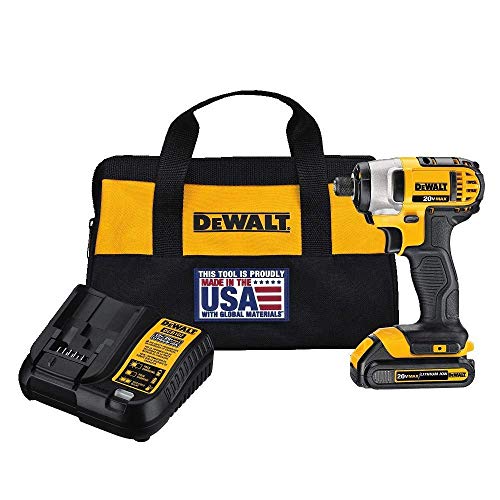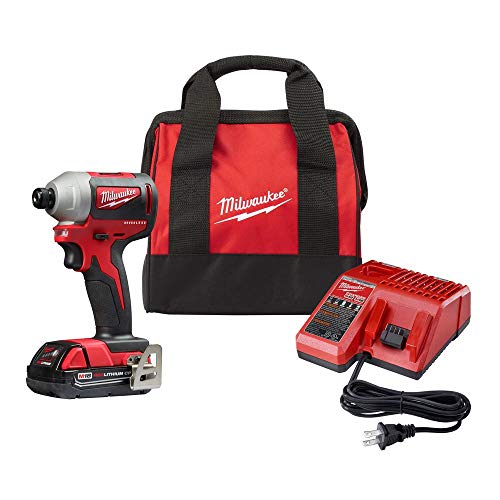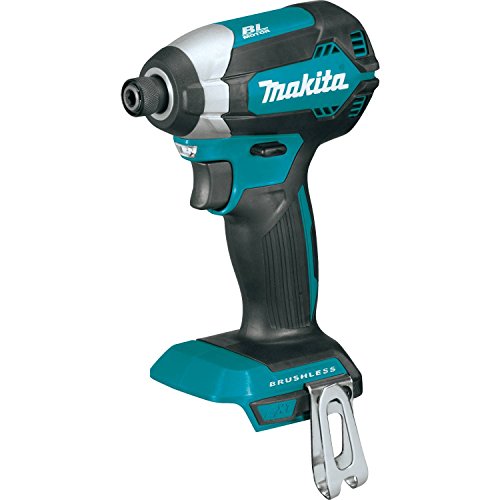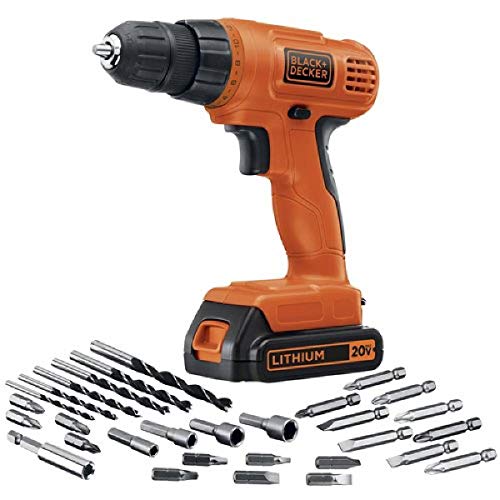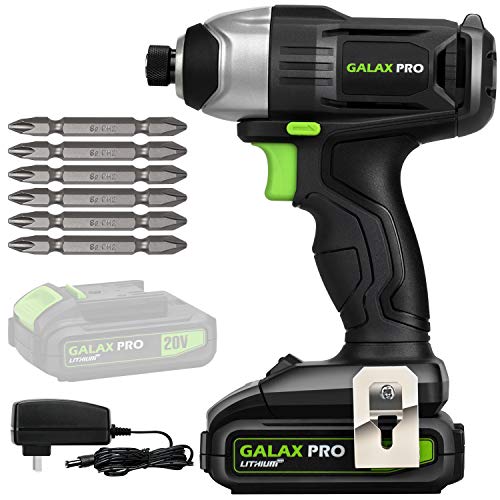Most of the repairs and improvements on your home are simple enough to be done by your hand. While picking up a set of tools and patching up that old hole may feel like a daunting task, you’re forfeiting the unique feel of satisfaction that nothing else can replace.
Not to mention that your wallet will also be thicker for the sum you would otherwise pay to a repairman.
Now, I know that the world of DIY construction is huge, and the first steps and challenges are truly scary, but you’re literally spending thousands of dollars on services you are very capable of doing yourself. You’ll need a hammer, a screwdriver, a drill, or you could buy an impact driver – an all-in-one tool that can easily replace most basic tools.
Even though this kind of technology isn’t new in the slightest, people who aren’t too tech-savvy may not have heard about it. Knowing this, I’ve compiled the list of the best 1/4 impact driver models that the market has to offer, so let’s take a closer look:
Best 1/4 Impact Driver Reviews
1. Dewalt 20V Max Impact Driver Kit
Quick overview:
DeWalt’s DCF885C1 is, in my humble opinion, the best 1/4 impact driver that the current market has to offer. It’s substantially sturdier, quicker, and stronger than most mid-range models I’ve tried along the years, and to top it all off, it’s even not that expensive.
Comfort-wise, it packs an ergonomic handle and boasts a remarkably light construction that can survive quite a bit of punishment. If I had to take an educated guess, I would say that DeWalt intended this driver for professional use right before figuring it would work wonders in the hands of laymen and casual handymen as well.
One of the features I liked the most about the DCF885C1 is the set of three LED lights integrated into the chuck; they are automatically activated after roughly twenty seconds of pulling the trigger. In a nutshell, this is a 20V powerhouse that will undoubtedly serve you well for years to come should you decide to give it a shot.
Highlighted features:
- Li-ion MAX battery
- LED light system
- 20V motor
- Ergonomic handle
- Steel and plastic construction
[i2pc show_title=”true” title=”Pros & Cons” show_button=”true” pros_title=”Pros” cons_title=”Cons” button_icon=”icon icon-cart-4″ link_text=”Check The Price Here” link=”https://amzn.to/3Fq6vo1″ ][i2pros]Terrific value for the buck
Lightweight and durable
Perfect for hard-to-reach spots
Dependable lighting
Remarkably strong performance[/i2pros][i2cons]
Dependable, but relatively short battery lifespan[/i2cons][/i2pc]
2. Milwaukee 2850-21P SB M18 Compact Brushless Cordless Impact Driver Kit
Quick overview:
Let’s head on to the runner-up pick, which is Milwaukee’s 2850-21P SB M18 brushless 0.25-inch impact driver bundle. The only reason why I didn’t award it with a perfect rating is that it’s a kit packed with accessories that you may or may not need.
Personally, I’m not too fond of toolkits, mainly since I already have most of the gadgets the brand’s supply with the box. At the same time, I have to say that the complementary accessories included in this package are absolutely remarkable.
Speaking of which, the bundle includes a 12 & 18V multi-voltage charger, a pack of M18 Red Lithium CP 2.0 AH battery pack, and a neat little contractor bag.
The driver itself resembles DeWalt’s model in more ways than one; it packs a sturdy, ergonomic handle, a brushless 18V motor, and it’s as durable as it is light. However, it doesn’t feature LED lights, and its chuck is slightly shorter, which are the most notable differences between the two.
Highlighted features:
- M18 Brushless Hex Impact Driver
- M18 & M12 multi-voltage charger
- M18 Red Lithium Battery Pack
[i2pc show_title=”true” title=”Pros & Cons” show_button=”true” pros_title=”Pros” cons_title=”Cons” button_icon=”icon icon-cart-4″ link_text=”Check The Price Here” link=”https://amzn.to/3DytGM4″ ][i2pros]All-inclusive professional power-tool bundle
High-quality construction
Decent battery lifetime
Lightweight[/i2pros][i2cons]Short chuck
Pricey[/i2cons][/i2pc]
3. Makita XDT13Z 18V LXT Lithium-Ion Brushless Cordless Impact Driver
Quick overview:
Makita’s XDT13Z is a top-shelf 18V impact driver equipped with a robust brushless motor, a set of excellent batteries, and three selectable RPM settings. As far as raw performance is at stake, Makita’s impact driver offers superior explosive power and torque, albeit its snub-nosed chuck doesn’t make it particularly great for narrow spots and crevices.
However, it’s just a bit heavier than the previous models I’ve reviewed, weighing roughly 2.4 pounds. Even so, it would still be fair to say that it’s lightweight.
If we compare it to an average mid-range driver model, Makita’s XDT13Z can be labeled as ‘expensive’. It belongs to the upper tier of the medium price range, although the features it’s supplied with and its outstanding sturdiness leave most similarly priced units in the dust.
Highlighted features:
- BL Brushless and Cordless design
- Three selectable RPM settings
- Steel and plastic construction
- Ergonomic handle
[i2pc show_title=”true” title=”Pros & Cons” show_button=”true” pros_title=”Pros” cons_title=”Cons” button_icon=”icon icon-cart-4″ link_text=”Check The Price Here” link=”https://amzn.to/3qEi5Yt” ][i2pros]Sturdy build
Reliable all-around performance
Small and compact design
Great for most household tasks[/i2pros][i2cons]Battery and charger are not included
Heavier than average[/i2cons][/i2pc]
4. Black+Decker 20V Max Impact Driver Kit BDCI20C
Quick overview:
If you’re on the market looking for a quality impact driver, I would warmly recommend that you check out Black+Decker’s BDCI20C model. Essentially, this driver offers outstanding durability, 20 volts of sheer power, and a long-lasting BD Max Power Connect Li-Ion set of batteries.
Its head is slightly bigger than average, although overall it is small enough to be considered ‘compact. One of the things I liked the most about Black+Decker’s BDCI20C is the fact that it packs 1375 IPM rating, which makes it one of the best-performing drivers in its price range.
Speaking of which, it’s substantially cheaper when compared to Makita’s, Milwaukee’s, and DeWalt’s driver models, making it an excellent choice for people on a cash-strapped budget.
As far as comfort is of concern, Black+Decker’s BDCI20C is supplied with a robust, grippy handle that feels remarkably natural when held. I gave it a bonus star simply because it’s much safer to use than most models equipped with bare-plastic handles.
All things considered, I would have to say that I would gladly have paid twice as much cash for it if I had to; Black+Decker’s BDCI20C impact driver’s performance is dramatically superior to most entry-level hobbyist drivers.
Highlighted features:
- Grippy, non-slip texture on the handle
- Sturdy steel construction
- 20V brushless motor
- Black+Decker MAX Power Connect Li-Ion bats
[i2pc show_title=”true” title=”Pros & Cons” show_button=”true” pros_title=”Pros” cons_title=”Cons” button_icon=”icon icon-cart-4″ link_text=”Check The Price Here” link=”https://amzn.to/2YPPZhi” ][i2pros]Exceptional battery lifetime
Much sturdier than average
Compact and decently light
Exceptional torque rating
Affordable[/i2pros][i2cons]A bit bigger than average[/i2cons][/i2pc]
5. Galax Pro 20V Lithium Ion 1/4 Hex Cordless Driver
Quick overview:
Let’s wrap things up with Galax Pro’s 20V Li-Ion cordless impact driver model. Basically, this is my runner-up pick for the ‘budget 0.25-inch impact driver category’; aside from being a bit cheaper than average, it’s surprisingly durable and offers exceptionally robust performance.
One of the things I liked the most about it is its automatic highly-responsive trigger. Namely, it doesn’t come supplied with selectable RPM settings, but you will get to affect the velocity of rotations through the way you pull on the trigger.
Highlighted features:
- Responsive trigger
- Snub-nosed chuck
- Galax Pro Li-Ion battery pack & charger
- Six S2 PH2 extensions
[i2pc show_title=”true” title=”Pros & Cons” show_button=”true” pros_title=”Pros” cons_title=”Cons” button_icon=”icon icon-cart-4″ link_text=”Check The Price Here” link=”https://amzn.to/3oCeoQa” ][i2pros]Quality beginner’s impact driver bundle
Decent battery lifespan
Compact design
Rapid charging station[/i2pros][i2cons]Not ideal for professional use[/i2cons][/i2pc]
What to consider when buying an impact driver
Now that we’ve seen some of the best rated impact driver models, I’d suggest that you stick around as I touch upon the criteria I used to separate mediocre and ‘good’ drivers from the actual best 1 4 cordless impact driver units.
In all fairness, picking the right 0.25-inch impact driver should be a breeze if you have some handyman knowledge, but on the other hand, it will probably be fairly challenging if you’re new to the world of compact power tools. Be it as it may, I surely hope you’ll find this guide as helpful, so let’s proceed:
Impact driver vs Impact Drill
Before we get down to business, I’d like to clear up some fairly common misconceptions about the usefulness and practicality of 0.25-inch impact drivers. Namely, they’re exceptionally versatile and well-rounded, but they’re not the ultimate tools that can do anything from opening a can of beer to building a house from the ground up.
Impact drivers are essentially meant to pack a strong punch (torque) in terms of screwing, which makes them a necessity for a variety of screwing tasks. They’re fairly easy to use generally speaking, but this largely depends on what type of screws you intend to drill.
Impact Drills, on the other hand, have significantly less torque in comparison to the impact drivers, but that’s precisely the reason why they’re perfect for situations where accuracy and precision are mandatory. These drills are a bit slower, but they afford you with opportunities to drill around delicate holes with ease.
Brushed vs Brushless impact driver
While I don’t have anything against brushed motors, I find that brushless models are significantly more valuable for the buck due to multiple reasons.
Without getting too deep into details, the brushless motors do not feature commutators or brushes in their design; instead, a special electronic controller is there to basically perform both functions at the same time, which offers a bit simpler approach to how the impact driver is supposed to be used.
In that regard, drivers outfitted with a brushless motor are significantly more beginner-friendly, and that’s precisely what I was looking for when I got the DIY bug.
Aside from the fact that they’re much easier to use, they’re also a bit lighter (obviously, the weight of the brushes and the commutator is excluded).
Due to the fact that no matter how well-designed the brushes may be, they will inevitably wear with time. A brushless motor will not present you with such problems, so it’s easy to deduce that you’ll have less to do in terms of maintenance as well.
Finally, brushless motors last a bit longer. A worn brush may begin to spark, creating a health hazard, so I’d warmly recommend going for models with brushless motors for this reason alone if not for anything else.
The only benefit that comes to my mind as far as brushed motors are of concern is affordability. Essentially, they’re relatively cheaper to design and build, so their price tag is typically a bit more approachable. Nevertheless, I’d suggest saving up a few bucks to invest a quality model with a brushless motor anyway.
Choosing the right fit
Impact drivers are naturally pretty versatile. Whatever it may be that they initially lack in you can easily compensate for with add-on accessories. Even so, one of your main concerns should be to find a suitable model for your particular needs.
Even though I’ve mainly talked about 0.25-inch impact drivers, there’s still a vast, diverse world of different units that the market has to offer.
Some are torque-packed powerhouses that are ideal for heavy-duty tasks; some are lighter and a bit more practical for basic household chores; some models are in-between, offering modest performance in all aspects with minimal drawbacks.
Corded vs cordless
Basically, the invention of cordless impact drivers put most corded models out of business nearly instantly. There are no actual shortcomings of cordless models aside from the fact that you’ll have to keep a steady supply of batteries.
Speaking of which, I would recommend picking a model with that offers a sufficient battery life if you want to avoid constant inconveniences, such as for instance the driver running out of juice in the middle of the job.
Lithium Ion (Li-Ion) batteries are immensely popular; not only are they fully rechargeable, but they also offer improved reliability and extended runtime. Even if you’re running a bit low on cash, being cheap in this field isn’t the end of the world; you will wind up with heftier battery resupply costs, though.
Size, compactness and weight
Each impact driver model is different in terms of dimensions. Even though this is not the most important aspect of a driver unit, I’d still recommend keeping it in mind for several reasons.
First and foremost, smaller models are not only easy to use, but they’re also a bit easier to store and maintain as well. Secondly, tiny drivers are easier to handle; in my experiences, smaller models also proved to be much lighter, although size doesn’t necessarily affect the overall weight in all cases.
Voltage
Voltage is one of the factors that heavily influences the strength of any driver. Basically, most common drivers come in either 12V or 18V variations; obviously, 12V models are a bit weaker in the sense that they pack less inch-pounds. However, even the tiniest 12V models are excellent tools that will allow you to tackle most screwing tasks with ease.
The 18V models are generally favored by professional construction workers who need the extra strength and rotations. I should also mention that 18V models are typically a bit more expensive, for as long as we’re comparing models with similar features and durability.
Selectable rotation settings
The ability to tweak the speed of your driver’s rotations is not just a feature of convenience. Namely, having a powerhouse driver that is constantly blowing on all cylinders can even be dangerous, especially if you’re not overly experienced with impact drivers to begin with.
Essentially, most modern-day impact drivers feature at least a few selectable RPM (rotation-per-minute) settings, affording you a bit of extra flexibility when tackling different kinds of tasks.
Furthermore, better models are also supplied with more responsive triggers that react to the pressure while abiding to the pre-selected RPM range. For example, if you’ve set the RPM setting to the range of 0-2,000, by pressing the trigger full on you’ll end up with 2,000 rotations; being a bit gentler will leave you with half as many rotations.
Torque levels
Even if you’re completely oblivious to all other features of any impact driver, you can still make the right choice if the model packs enough torque for your particular needs. Just like wattage represents the strength of electric devices, torque represents the power of a bit more analog contraptions.
The IPM rating is tightly correlated to torque; this abbreviation represents ‘impacts per minute’, and it essentially tells you what kind of performance you should expect from any given model.
Frequently asked questions
We’ve covered the best 1/4 impact driver models and what they’re made of, why and when they should be used, and bits and pieces of information regarding how they should be used.
Even so, I’ve purposefully constructed the buying guide to be a bit warmer towards slightly experienced handymen than immediate beginners.
If you’re new to the world of DIY construction, you probably have a ton of questions regarding what may be the best model that the current market has to offer, what’s the most valuable impact driver, and such. The following sections should shed some light on some of the most frequently asked questions regarding a 0.25-inch impact driver’s performance:
What is the best 1/4 impact driver?
I may be somewhat biased as I’ve been using Dewalt’s DCF885C1 for a bit longer than the other four impact drivers on the list, but I also have a series of strong arguments to back my claim that it’s the best 1/4 impact driver, arguably of all time.
First of all, this model is undeniably more durable than most similarly priced impact drivers, and that’s something most professionals who’ve used DeWalt’s gear at least once can easily agree on. From the controls, over the rugged plastic handle, down to the robust steel head, this model is simply sturdier than most I’ve come across.
Secondly, this impact driver is at this point basically an extension of my right arm. The ergonomic grip feels so natural, and the fact that the driver as a whole is remarkably light speaks volumes about how much of a convenience it is, regardless of whether I’m wrapping up old projects around the house or if I’m at the site.
Speaking of convenience, I’ve relied on its LED lights more than my flashlight, to be perfectly fair. The lights are adequately bright, but more importantly, they’ve served me through thick and thin, even when the batteries were less than halfway done.
Even though I’ve made up my mind about it being the best 1/4 impact driver based on how it performs, I would also commend DeWalt for providing the fast charger as a complementary feature. At the time when the box arrived I misplaced the one I’ve been using for the longest time, so I can only imagine that I won’t be alone in such a scenario.
What do you use a 1/4 impact driver for?
The most common use of an impact driver is for tightening nuts or driving screws. Stronger models can be used in heavy-duty construction, but that largely depends on the compatibility with your actual toolkit (adapters, hardware, and the surface itself).
Personally, I consider impact drivers as versatile, all-around tools, but at the same time I acknowledge their shortcomings, with the most obvious one being the fact that they don’t accept bits other than 0.25-inch hex shanks.
Simply put, a 0.25-inch impact driver is an excellent tool to have for most handyman tasks you may want to do around the house. Even if you don’t have a huge arsenal of adapters (or even basic tools for that matter), an impact driver can easily replace a mediocre handheld drill or even the best-rounded heavy-duty screwdriver.
What is the best impact driver for the money?
My 1 4 impact driver reviews included some of the finest models I’ve had the pleasure of using, testing, and relying on in the past several years. From a subjective standpoint, I’d put my money on my Dewalt DCF885C1 any time of the day as it’s been my go-to driver ever since I laid my hands on it.
However, a casual handyman is probably spending a bit less time tinkering around the house and may not need all the features (and the remarkable strength) it has to offer.
That being said, I would nominate Black+Decker’s BDCI20C as the impact driver that offers the highest price-to-value ratio.
It’s fairly cheaper than DCF885C1, and even though it’s just a bit weaker, it gets the job done without fail. Even though you may struggle to use it for heavy-duty tasks, I guarantee you’ll find it as one of the most convenient beginner-friendly impact drivers that the market has to offer.
What is the difference between a 1/4 and 1/2 impact driver?
Aside from the obvious (which is their size), the main difference between a 1/4 and 1/2 impact driver revolves around usability.
Namely, 0.25-inch drivers are relatively versatile tools that can be used to screw most types of smaller hardware. Alternatively, this can also be achieved with bigger tools if you have appropriate adapters, but that’s usually the least practical way to go.
On another hand, 0.5-inch (½) impact drivers are supposed to accommodate impact socket installation tasks and the setup of bigger hardware pieces.
As a rule of thumb, you can always try to answer the question ‘how big of a screw do I need to install?’; smaller ones can be screwed with even the weakest 1/4 impact drivers while the huge sockets require a bit of extra punch.
Should I buy a drill or impact driver?
It all boils down to what type of projects you aim to do. A professional will have a bag full of tricks, comprised of a hammer drill, an impact driver, and an impact drill, all suited for different kinds of tasks.
As someone who’s been in the construction business for more than a few decades, I’ve done my fair share of hammering, drilling, knocking, pounding, and pretty much everything along those lines, and I can safely say that impact driver can accomplish nearly all of the aforementioned with ease.
I used to rely on hammer drills for sheer brute strength and impact drills for quick, delicate projects, but after I got a hang of how impact drivers work, they quickly became my go-to tools. In my humble opinion, I think that if you’re faced with a choice, impact drivers get my vote.
Conclusion
As far as I’m concerned, DeWalt’s DCF885C1 is the best 0.25-inch impact driver out there. Its superior versatility affords unparalleled flexibility, making it a perfect choice for both hobbyists and professionals. I would recommend it to anyone who is searching for a quality impact driver, as it brings tremendous performance and a robust construction to the table, among other things.
If you’re not particularly interested in an all-around solution are searching for a specialized solution instead, I would recommend checking out Milwaukee’s 2850-21P SB M18.
Finally, to people who can’t afford to spend so much money, I recommend Black+Decker’s BDCI20C. This is an excellent entry-level impact driver that is as affordable as it is easy to use.


